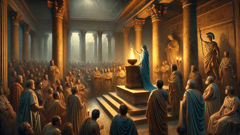Introduction
In the heart of ancient Rome, where the seven hills stood silent witnesses to the rise and fall of ambition, fate often arrived on silent feet. The Forum bustled with merchants and senators, their voices echoing between marble pillars and the lingering aroma of incense from distant temples. Yet, beneath this surface of order and grandeur, a current of unease flowed—one born of omens, whispers, and the chilling knowledge that Rome's destiny was shaped as much by prophecy as by sword and law. Among the city’s greatest mysteries stood the tale of the Sibylline Books—a legend woven through generations, stitched into the tapestry of Rome’s identity. It was a story recited by grandmothers at dusk and debated by scholars at dawn, its truth cloaked in the same shadows that shrouded the Capitoline Hill. The legend began not with a battle, but with an arrival: a lone woman, cloaked in faded blue, her eyes deeper than the Tiber at midnight, approached the gates of Rome. She called herself a Sibyl, a priestess of Apollo, keeper of secrets older than empire. In her arms she bore a chest—weathered, ancient, and sealed with wax—containing nine books, she claimed, inscribed with the fate of Rome. Her feet were dusted from long travel, her hair streaked with silver that glinted in the winter sun. She sought an audience with the king: Tarquinius Superbus, last of the Roman monarchs, whose pride was legendary and whose suspicions ran deep. What happened next would become the stuff of legend, shaping the destiny of a city and the very soul of its people. The Sibyl’s offer was simple but confounding—a test of wisdom and humility, cloaked in the riddles of prophecy. Yet in Rome, wisdom was a rare coin, and pride too easily spent. As the Sibyl set her price, and as the king weighed gold against destiny, a silent reckoning unfolded. This is the story of the Sibylline Books: a tale of warning, loss, and the unfathomable cost of turning from wisdom when it knocks at your door.
The Arrival of the Sibyl
The city was restless that winter morning. A cold breeze swept in from the Alban Hills, scattering laurel leaves across the emptying streets. The guards at the Porta Capena huddled close, exchanging muted jokes about omens and ill winds, when they noticed her—a figure moving with deliberate calm through the drifting mist. She paused before the threshold, her presence a quiet force that seemed to still the air. The Sibyl’s robes were faded yet regal, woven with ancient symbols only the eldest priests might recognize. Her hair flowed in silvered waves beneath her hood, framing a face marked by time and wisdom. It was her eyes, though, that unsettled the guards—dark as obsidian, yet kindled with an inner fire.

She carried a chest: olivewood, bound with tarnished bronze and sealed with thick red wax. The guards, uncertain but wary of offending what might be a sacred visitor, sent word to the palace. Messengers darted through the Forum, weaving between vendors’ carts and stoic senators, until they reached the great hall of Tarquinius Superbus.
The king was a man whose ambition had raised new temples and whose pride had razed old alliances. He was not known for patience, and yet something in the messenger’s trembling voice—some whispered warning about omens and priestesses—caught his ear. He summoned his advisors and awaited the visitor in the marble-clad throne room, the air perfumed with frankincense and anticipation.
The Sibyl entered with measured grace. She did not bow or cower, nor did she speak until Tarquinius fixed her with a gaze meant to intimidate. She stood her ground, her hands resting on the chest as if it were both a burden and a shield. "I am the Cumaean Sibyl," she announced. Her voice was steady and ageless, echoing off the frescoed walls. "I bring you books that contain the future of Rome—its triumphs and tragedies, its rise and fall."
Tarquinius eyed the chest. His court bristled with skepticism, but a hush fell as the Sibyl continued. "Nine books," she said, "written in prophecy. For these, I ask a sum of gold—so much that even a king will feel its loss."
The room stirred. Tarquinius laughed, a short bark that betrayed his discomfort. "Why should I pay so much for words?"
The Sibyl did not flinch. "These are not mere words," she replied. "They are warnings and wisdom from Apollo himself. You may take them or refuse them, but I will not alter my price."
The king’s pride bristled. He dismissed her, refusing to meet her gaze. The Sibyl turned, and as she reached the threshold, she paused. With a whisper, she called forth a small flame from her hand and, in view of all, set three of the books alight. The flames consumed them quickly, their prophecies vanishing in curls of smoke. Without another word, she left the palace.
Days passed. The court buzzed with gossip. Some whispered that the king had made a grave error; others mocked the Sibyl as a charlatan. Yet, a sense of foreboding lingered in the air, like the scent of rain before a storm.
The Second Bargain and a King’s Folly
A week later, the Sibyl returned to the city gates, her presence as commanding as before but her burden lighter. She now carried only six books. The wax seals were freshly applied, and the chest’s bronze bands shone where the flames had licked them. Again, she demanded entrance, and again the guards—now more fearful than curious—hurried word to the king.

Tarquinius received her coldly. He eyed the diminished chest and scoffed. “You return with fewer books, yet I sense you will ask the same price.”
The Sibyl nodded. “Six books remain. The price is unchanged.”
The king’s counselors urged him to reconsider; some whispered that destroying prophecy was a dire omen, a sign of divine displeasure. But Tarquinius was stubborn. “You burn your own goods and expect me to pay the same? Are you mad?”
The Sibyl’s eyes narrowed—not in anger, but in something closer to sorrow. She turned once more, and before the assembled court, set another three books alight. The parchment curled and blackened; sacred ink faded into nothing. Again, she left in silence, vanishing into the streets before any could stop her.
Rome grew uneasy. In temples across the city, priests reported strange portents: lightning splitting the sky on cloudless nights; flocks of ravens circling the Capitoline; statues weeping tears of red ochre. The Senate, usually dismissive of superstition, grew anxious. Some senators even sent envoys to seek the Sibyl, but she remained elusive.
At night, Tarquinius found himself haunted by dreams—visions of Rome burning, legions fleeing across distant fields, a shadowed figure watching from the hills. His pride, however, chained him to his refusal. He told himself that wisdom could not be bought at any price, especially from a stranger.
But word reached the king: the people murmured in the streets. His power, once absolute, felt less certain in the grip of unease. It was then, late one evening as a cold rain beat against the palace windows, that the Sibyl appeared for a third and final time.
The Last Chance: Wisdom or Ruin
The rain ceased just before dawn. A pale mist crept along the Tiber, curling around the city’s walls as if trying to keep Rome shrouded from fate itself. In the royal chambers, Tarquinius Superbus paced beneath frescoes depicting Jupiter and Mars. He could not sleep; his mind circled with unease.

Before sunrise, a page entered with trembling steps. "The Sibyl waits," he announced. Tarquinius straightened his robes and ordered her brought forth.
This time, the Sibyl’s chest was smaller, lighter. Only three books remained. She was soaked from the rain, her cloak trailing mud on the marble floor. Yet her bearing was unchanged—regal, implacable.
She spoke before the king could find his words. "Three books remain. Their wisdom is worth more than gold or empire. The price is unchanged."
Tarquinius hesitated. The court was silent; even his most sycophantic advisors did not dare to speak. The king’s pride waged war against his growing fear. The memory of burning books haunted him—their secrets lost forever.
He tried to bargain, but the Sibyl shook her head. "There will be no more offers. Take these books for my price, or lose them forever."
At last, Tarquinius relented. He summoned his treasurer and paid the full sum—so much gold it filled two great urns. The Sibyl watched in silence as her payment was counted.
When all was done, she handed him the chest. "Guard them well. Consult them in times of peril. But remember: wisdom comes at a cost."
With that, she turned and vanished into the morning mist. Some said she walked down to the Tiber and disappeared beneath its waters; others claimed she ascended the Palatine and melted into the ancient groves.
The three books—what remained of the nine—were entrusted to the care of the priests of Jupiter Capitolinus. They were kept in a stone vault beneath the temple, their secrets revealed only during times of crisis, when Rome’s fate hung in the balance.
Conclusion
The legend of the Sibylline Books endured for centuries, etched into Rome’s memory and shaping its destiny at crucial moments. Whenever famine threatened or invaders gathered at the gates, priests would descend into the temple vaults, seeking guidance in the cryptic verses left by the Sibyl. Rome survived storms, wars, and civil strife—but never forgot that three books stood where there should have been nine. The wisdom they contained was a fraction of what might have been—a constant reminder that pride can blind even the mightiest to what truly matters. The tale outlived Tarquinius Superbus, echoing through the Republic and Empire as a lesson for all ages: true wisdom cannot be measured in gold, and once lost, some knowledge can never be regained. In the end, it was not simply a story of prophecy, but a warning—that the greatest danger to any city or soul comes not from the unknown, but from turning away those who offer hard-earned truth. To this day, the name of the Sibylline Books conjures images of lost wisdom, missed chances, and the fragile balance between destiny and choice.













